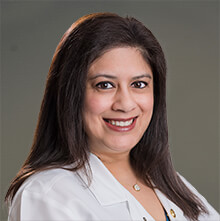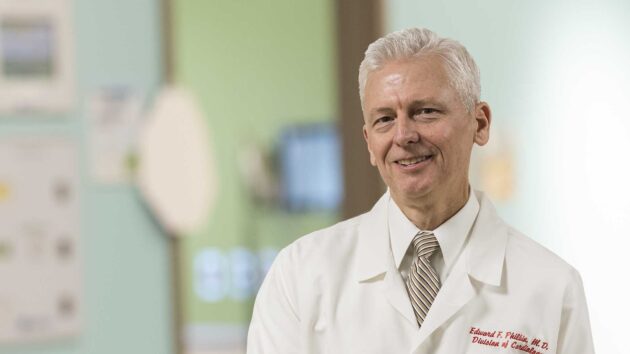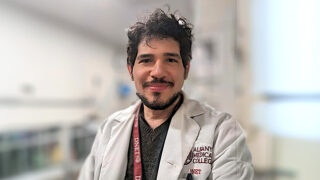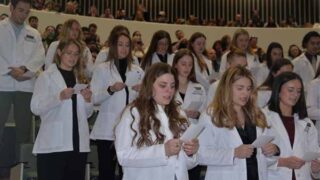Welcome Letter

Welcome to the Albany Medical Center Cardiovascular Fellowship!
Albany Medical College was founded in 1839 and since that time boasts a rich history in medical education. Our Cardiovascular Fellowship Program has been in place for over 50 years and has produced many successful academic and clinical cardiologists. I am proud to tell you that I, and many of my colleagues are graduates of this program!
We are collectively committed to the education of our fellows, house staff, and medical students. As an applicant, you have many fellowship programs to consider.
Our goal is to provide you with a superior training experience while also giving mentorship and support as needed. We recognize that during the next three years, life will throw you certain challenges, and we are here for you! I can promise that our fellows have a remarkable sense of camaraderie, which I feel only enhances the training program and allows you to have an experience that will be tremendously rewarding. Our fellows are the heart of our Division of Cardiology and their education and experience coupled with excellent patient care is our priority. We look forward to meeting you!
Sulagna "Suzie" Mookherjee, MD, FACC
Director, Cardiovascular Disease Fellowship Program
About Albany Medical Center
Albany Medical Center is a 766-bed tertiary referral center serving the greater Albany area. With referrals and transfers from over a 100-mile radius, including Western New England, southern Vermont, and up to the Canadian border, there is a wide-spectrum of cardiovascular disease. The hospital boasts multiple dedicated cardiovascular telemetry floors, in addition to a large 18-bed dedicated CCU and 18-bed cardiovascular surgery ICU (CPS). Active heart failure, electrophysiology, interventional cardiology and structural heart disease, and cardiothoracic surgery programs are available at Albany Medical Center.
Albany Medical Center is the cornerstone of the Albany Med Health System, the largest and only regionally governed, not-for-profit health system in northeastern New York and western New England. We offer our communities the most medical specialties.
VA Training
The Stratton Veteran's Administration Hospital is a 156-bed acute and chronic care facility located directly across the street. It’s diverse faculty staffs the cardiology division, including interventional cardiology. Fellows spend two months of each year at the VA Hospital and experience unique advanced pathology in addition to standard cardiac pathology often seen at VA centers.
Research
A minimum of four weeks per year of dedicated research elective time is given to each fellow yearly to pursue either clinical research or quality improvement projects. All fellows are expected to complete their own research/scholarly project with attending guidance and mentorship by the end of fellowship and submit their scholarly work as both an abstract and manuscript to regional or national conferences and peer reviewed journals respectively. We have access to national AHA GWTG Heart Failure and Mission Lifeline STEMI databases.
Albany Medical Center’s Faculty in the Division of Cardiology is proud to participate in research and scholarly activity in the cardiovascular clinical sciences alongside our fellows, residents and students to learn and advance the field for improved treatments in cardiovascular care for our patients. Fellow research is critical to understanding diseases and improving therapies in cardiovascular medicine and fellows are mentored throughout their three years with our faculty to design and undertake a fellows scholarly project based on their interests. Clinical research studies led by fellows with close faculty mentorship strive to uncover answers needed and focus on the care of the patient and to seek to improve quality of life as well as the patient experience.
Joseph T. Doyle, MD, Endowed Prize in Cardiology
Dr. Joseph T. Doyle graduated from Harvard College (1935) and Harvard Medical School (1943). He completed his internship at Boston City Hospital and then entered the United States Army Medical Corps. Following the war, he returned to Boston to complete his training in medicine, serving as chief resident at Boston City Hospital from 1948-1949. He completed his postgraduate training as the Whitehead fellow in physiology from 1949-1950 at Emory University in Atlanta, Ga. He later had teaching appointments at Emory and Duke University. Dr. Doyle was recruited to Albany in 1952 to create and direct the Cardiovascular Health Center (CHC). The CHC was one of the pivotal cardiovascular epidemiology projects that led to much of our current understanding of cardiovascular disease. Dr. Doyle was the dean of Albany's cardiology community, having served on the Albany Medical College faculty since 1952 and achieving the rank of full professor in 1961. From 1960 through 1984, he served as head of the division of cardiology for the college and Albany Medical Center.
Dr. Doyle served as president of the Medical Society of Albany County, as president of the Heart Association of Eastern New York, as a member of the cardiac advisory committee of the New York State Health Department and the committees on cardiovascular disease and medical school relationships for the Medical Society of the State of New York. He served as the committee chair of the committee on conduct of the Office of Professional Medical Conduct. He was a former governor of Upstate New York for the American College of Cardiology.
He served as chair of the American Heart Association's council on epidemiology and as a member of the committee on smoking. He was a consultant to the National Heart, Lung and Blood Institute, and the National Institutes of Health, Bethesda, Md. Dr. Doyle was the author of over 130 publications, many of the products of his research as the director of the CHC. His landmark articles in the New Eng1and Journal of Medicine in 1962 and in the Journal of the American Medical Association in 1964 first alerted the world to the association between cigarette smoking and coronary heart disease. His publications using the combined data from the CHC and Framingham Heart studies resulted in our knowledge of the risk factors associated with sudden cardiac death, of the risk associated with a low HDL level, and of the perceived health benefits of moderate alcohol consumption on raising HDL levels. For 55 years, Dr. Doyle was a tireless servant to the people of the Capital Region, the State of New York, the nation, and, through his landmark research, the world.
Theodore L. Biddle, MD, Endowed Prize in Cardiology
Dr. Theodore L. Biddle was born in Pittsburgh. He graduated from Shady Side Academy in Pittsburgh, Bucknell University in Lewisburg, Pa., and Temple Medical School in Philadelphia. Following graduation from medical school, he completed an internship at Conemaugh Valley Memorial Hospital in Johnstown, Pa. He was then commissioned in the U.S. Navy as a lieutenant and served as a medical officer in Vietnam and Japan. After military service, he completed three years of residency training in internal medicine at Thomas Jefferson University Hospital, Philadelphia, and a two-year fellowship in cardiology at the University of Rochester Medical Center, Rochester, N.Y. where he continued on as a member of the faculty in the Division of Cardiology and Director of the Coronary Care Unit. He left Rochester in 1984 to accept appointments at Albany Medical Center and the Albany College of Medicine as professor of medicine and head of the Division of Cardiology succeeding Dr. Joseph T. Doyle.
Under Dr. Biddle’s leadership, the cardiology fellowships of the Albany Veteran’s Hospital and Albany Medical Center were combined. He was instrumental in expanding the full-time faculty and the clinical capabilities of the division in interventional cardiology, electrophysiology, and non-invasive testing. Dr. Biddle will be most remembered for his devotion to detailed physical examination and bedside teaching and especially for his caring, humanistic and sensitive approach to medicine and patient advocacy. Dr. Biddle retired in 2002 and was awarded the distinguished faculty title of Emeritus Professor of Medicine prior to his untimely death in 2003.
2022 Award Recipient
Theodore L. Biddle, MD, Endowed Prize in Cardiology: Casey White, MD
Joseph T. Doyle, MD, Endowed Prize in Cardiology: Casey White, MD



